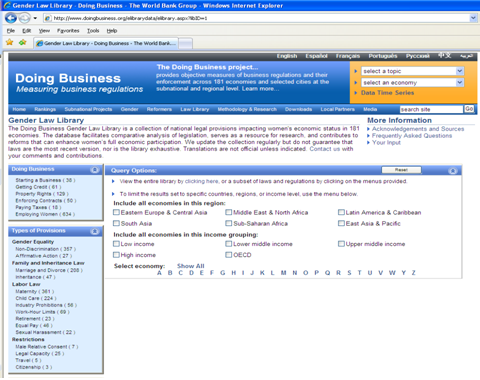Gender Law
Welcome to Wikigender’s Gender and the Law page
This section explores the intersection between gender issues and the legal and regulatory environment, with a particular focus on laws that impact the economic status of women. It is meant to be a collaborative effort, taking into account the perspectives and experiences of a variety of stakeholders.
Introduction
The legal and regulatory environment within a country can often have a significant impact on the ability of women to engage in business activities and become entrepreneurs. Labor laws, property rights, family law, and inheritance rights all have the ability to affect female entrepreneurs differently from male entrepreneurs.
For example, land tenure can often have a significant impact on the ability of women to conduct business. Having proof of land ownership to use as collateral can determine whether women are able to access credit to start or expand their businesses. Provisions in family law which designate the husband as the sole administrator of the couple’s wealth and property can impede the ability of a woman to conduct business. Inheritance law also impacts a woman’s economic status and her ability to start a business, since inheritance is often a source of start-up capital for would-be entrepreneurs.
Gender Law Library
The Doing Business Gender Law Library is a collection of national legal provisions impacting women’s economic status in 181 countries. The Library is constantly being populated and updated on an ongoing basis, and is meant to be a collaborative effor t with those who are interested in the intersections of gender and the law, including: Women’s Lawyer Associations, Women’s Business Associations, Law Schools and Law Libraries, NGO’s, development practitioners, and researchers. The Library is available at www.doingbusiness.org/genderlawlibrary
t with those who are interested in the intersections of gender and the law, including: Women’s Lawyer Associations, Women’s Business Associations, Law Schools and Law Libraries, NGO’s, development practitioners, and researchers. The Library is available at www.doingbusiness.org/genderlawlibrary
The Gender Law Library can help to deepen the research and analytical underpinnings of the ways in which the legal and regulatory climate impacts women. It facilitates comparative analyses of legislation, serves as a basis for research, and contributes to reforms that encourage the full economic participation of women. The availability of easily accessible and searchable national legal provisions impacting women’s economic status can enable governments and other stakeholders to engage with each other using substantive data to develop and share best practices.
Content
Legal Provisions covered in the Gender Law Library include those governing property and inheritance rights, business registration and employment. The library also identifies countries that are signatories of gender-related international conventions
The Library contains 15 different types of provisions that may have a particular impact on the ability of women to conduct business such as laws on marriage and divorce, inheritance, and affirmative action. Laws are also categorized based on law type, including statutory laws, constitutional provisions, and decrees and regulations.
In addition, the following Doing Business categories are covered in the Gender Law Library:
- Starting a Business: This section covers laws that pertain to special or additional requirements that women need to fulfill in order to incorporate a business. Other laws that impact the ability of women to engage in entrepreneurship are also included, such as laws that affect the ability of women to open bank accounts, mortgage property, get credit.
- Getting Credit: These legal provisions address a woman’s ability to dispose of her own property in order to secure credit, and conduct such transactions without the consent of a husband or a male relative.
- Property Rights:The property rights section captures provisions that affect women’s ability to access and dispose of property without first obtaining spousal consent for property-related transactions. These provisions are generally captured in inheritance laws, family and civil codes or marital property regimes.
- Enforcing Contracts: These laws cover women’s participation in dispute resolution proceedings. They include laws that enable women to access courts, and laws that assign differential weight to the legal testimony of women.
- Paying Taxes: This section covers laws that govern taxable income, tax credits and deductions that are available only to women, as well as tax deductions that are reserved for the male “head of the household.”
- Employing Women: This section covers restrictions on women’s work, such as prohibitions from night work or work in certain sectors. Also covered are laws on maternity protection regimes and child-care, equal pay, and equality in the workplace.
Current Challenges
The Gender Law Library is being populated and updated on an ongoing basis. Peer participation is highly encouraged in this effort. Contributions from researchers, donors and other development practitioners are most welcome and should be submitted through the Gender Law Library website at: www.doingbusiness.org/genderlawlibrary
Other Resources and Reading
Additional Resources
OECD Gender, Institutions and Development Data Base
The International Center for Not-For-Profit Law
Database on Gender and the Empowerment of women in the Arab Region
Further Reading
Customary and Islamic Law and its Development in Africa
Gender and Asset Ownership: A Guide to Collecting Individual Level Data
Gender Equality in Indian Laws relating to Women and Children & Children


